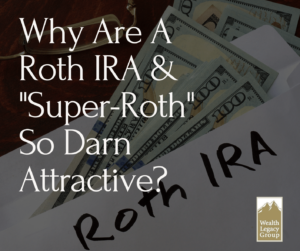Note: We’ve created an updated version of this article! Please check out
“To Roth or not to Roth? That is the question!”
 Last week I was contacted by a client who is receiving a substantial distribution from his retirement plan account. Given the fact that he will likely retire in a tax bracket equal to or higher than his current bracket, I asked if he had considered rolling some or all of his distribution into a Roth. “Can I do that? My CPA has told me that I make too much money.” My response was … “Your CPA is correct – and yet there are two clever ways to get around the income restriction rules for a Roth IRA.”
Last week I was contacted by a client who is receiving a substantial distribution from his retirement plan account. Given the fact that he will likely retire in a tax bracket equal to or higher than his current bracket, I asked if he had considered rolling some or all of his distribution into a Roth. “Can I do that? My CPA has told me that I make too much money.” My response was … “Your CPA is correct – and yet there are two clever ways to get around the income restriction rules for a Roth IRA.”
If you feel that you have enough money in your retirement accounts already, that strategic planning doesn’t matter, or you simply don’t care about how much tax you pay on your retirement income … read no further! If on the other hand, you wish to accumulate as much money as possible towards retirement and on a tax-efficient basis … then read on!
A Roth IRA is a special retirement account where you pay taxes on money going into your account and then all future withdrawals are tax free.
Most investors should have at least a Roth IRA – or even better, the “Super-Roth” (explained below) as part of their overall retirement planning strategy. (You do have a retirement planning strategy, don’t you? If not, please read “Will You Outlive Your Retirement Income?” article I wrote which discusses the importance of having written goals for accumulation.
What Are The Benefits Of A Roth IRA Overall?
- Tax-free growth and withdrawals—a Roth IRA provides tax-free growth potential and withdrawals, which can help minimize taxes and maximize retirement savings. In a Roth IRA, you contribute money that has already been taxed (“after tax” dollars) into a retirement plan account where it will remain tax free when you withdraw it, as long as the money has been in the account for at least 5 years, and you are age 59½ or disabled.
- No required minimum distributions—unlike a traditional IRA, which requires you to make required minimum distributions when you reach age 70½, the Roth IRA has no such requirement.
- Avoid Social Security tax—you may wind up with a break on Social Security tax as compared to a traditional IRA. The annual distribution a person receives from a traditional IRA increases their annual taxable income, which can cause up to 85% of their Social Security benefits to be taxable for each year of their retirement. It can also bump the taxpayer into a higher tax bracket.
- Tax-free income for your beneficiaries—when you are deceased, your beneficiaries can receive your Roth IRA distributions on an income tax-free basis, whereas the beneficiaries of a traditional IRA must pay income tax on the distributions.
- Eliminate or reduce the Health Care surtax—Roth IRA distributions do not increase the “modified adjusted gross income” on your tax return and therefore can eliminate or reduce the 3.8% Health Care surtax on incomes above a certain level. Traditional IRAs do receive this benefit.
Income Eligibility Rules (With two work-arounds presented later in this piece!)
The IRS has certain eligibility requirements concerning Roth IRAs. For 2015, the phase-out range for adjusted gross income is:
- Single or head of household: $116,000 to $131,000
- Married filing jointly or qualifying widow(er): $183,000 to $193,000
- Married filing separately: $0 to $10,000
The lower number above represents the point where the taxpayer is no longer allowed to contribute the maximum yearly contribution. The higher number above represents the point where the taxpayer cannot contribute to a Roth IRA at all. So, for example, if you are single and have $131,000 or more in adjusted gross income in 2015, then you are not permitted to contribute to a Roth IRA for this particular year.
So What Is The First Work-Around For The Income Eligibility Rules?
There is a special exception for the income phase-out rules. What is that, my client wanted to know? If you are rolling money from a formal retirement account such as a 401(k), Profit-Sharing Plan, a Defined Contribution or Benefit Plan, etc., that money can be sent to an IRA Roll-over account. There is no tax if rolling your account balance in full to this type of IRA. Next, you can then elect a “Roth Conversion” of some or all of the IRA Roll-over account. This is without regard to your current income. (Note however, that additional contributions to the Roth are subject to the income eligibility rules.)
Retirement Plans That Can Be Rolled Into A Roth IRA
You can convert the following plans to a Roth IRA: traditional, SEP, and SARSEP IRAs, 401(k) plans, profit sharing plans, 403(b) annuity plans, 457(b) plans and inherited 401(k) plans. A SIMPLE IRA can also be converted to a Roth IRA but it must be at least two years old before a conversion can take place. IRS rules prohibit the conversion of an inherited IRA or an education IRA into a Roth IRA.
Factors That Help Determine Whether Converting To A Roth IRA May Be Right For You
The issue is whether you should make tax-deductible contributions to a traditional IRA versus pay the taxes up front and then have tax-free withdrawals during retirement with a Roth IRA. The factors to resolve this issue include:
- Taxes—if you roll your existing retirement assets into a Roth IRA, you have to pay federal income taxes on the amount of the IRA converted. But, none of the future earnings of the Roth IRA are subject to taxation as long as the money has been in the account for 5 years, you are 59 ½ years old or you are disabled. The most this country has ever imposed on taxpayers was near the end of World War II in 1944, when the top marginal tax rate was 94%. The U.S. national debt is currently at $18.4 trillion. Revenue paid by taxpayers is likely to be reduced for the foreseeable future as the aging baby boomers are beginning to retire and will no longer be paying as much in taxes to the federal government. While I hope we never again get to such a situation as in 1944, it is likely that tax rates will increase sometime in the near future to help pay down the huge weight of our national debt. If it is likely that tax rates will be higher when you receive your future retirement income, then it may make sense to convert to a Roth IRA now.
- Time—in general, the longer the amount of time you have to hold the investment in the Roth IRA, the greater the advantage of the Roth IRA. If you expect to withdraw your contributions to the Roth IRA in less than 5 years, then you are better off keeping your money in a traditional retirement account because the IRS will assess a 10% early withdrawal penalty.
- Costs—since you are using “after tax” dollars in your Roth IRA, you must pay any federal income taxes if you are rolling the money over from a traditional retirement account. You need to make sure you will have enough money set aside to pay the resulting taxes. As a way to minimize how much you will have to pay in taxes, you may want to consider converting to a Roth IRA over a number of tax years in amounts that will keep the conversion within your current tax bracket or within the next higher tax bracket.
Can I Ask For A “Do-Over” If I Do A Rollover And The Investment In The Roth IRA Does Poorly?
Yes, you can! If you roll your money into a Roth IRA and the investment goes south, or you simply change your mind, you can reverse the process (the technical term is “recharacterize”). You have until October 15th to recharacterize the contribution if you filed your tax return by April 15th.
What Is The Second Work-Around – The Super-Roth?
Despite the many advantages of a Roth IRA, it may not be the preferred option for all investors, especially given the annual income earnings restrictions as outlined above. There are, however, special life insurance contracts that are considered “investment-grade” which have minimal amounts of death benefit and maximize the earnings growth inside the contract. Contributions are after-tax, just like a Roth IRA, and earnings grow without tax. Distributions can also be taken without income tax as long as a certain amount of survivor benefit remains intact. Not only can these contracts provide supplemental income, but some of the newest contracts can even add a benefit to reimburse the insured for long term care expenses as well … something not permitted in an ordinary Roth IRA.
Obviously, determining which of many strategies to employ takes a detailed analysis and deeper conversation. We use a sophisticated computer program to run various scenarios to help you determine whether converting to a Roth IRA or utilizing a Super-Roth may be desirable, and how much will be needed in various scenarios. We specialize in making the complex simpler. What is your situation? Just as with our client, we can provide answers to the most challenging of situations… tailored to your unique situation.
“Imagine That™”!
Written by R. J. Kelly – January 2014
Note: We’ve created an updated version of this article! Please check out
“To Roth or not to Roth? That is the question!”
Read Next:


Pingback: Tax-Free Income In Retirement: Why Is It Important & How Do You Do It? - Wealth Legacy Group®, Inc.